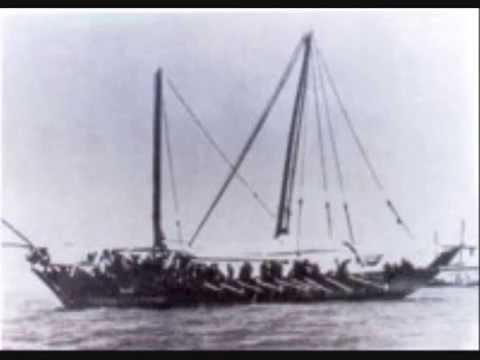
This article was last updated on April 16, 2022
Canada: ![]() Oye! Times readers Get FREE $30 to spend on Amazon, Walmart…
Oye! Times readers Get FREE $30 to spend on Amazon, Walmart…
USA: ![]() Oye! Times readers Get FREE $30 to spend on Amazon, Walmart…
Oye! Times readers Get FREE $30 to spend on Amazon, Walmart…
Taleb al-Refai’s Al-Najdi was longlisted for the 2018 International Prize for Arabic Fiction (IPAF). It’s a compelling portrait of Capt. Ali al-Najdi, and Mariam al-Doseri argues that the novel should’ve won a spot on the IPAF shortlist of six:
By Mariam Al-Doseri


“Come,” the sea calls to five-year-old Ali al-Najdi. “Come,” it still calls to him at seventy. And between the initial summoning and the last, Taleb al-Refai takes the readers of his latest novel, al-Najdi (That Al-Salasil, 2016), through a vortex of flashbacks and memories of a lifetime, relived in a single day — the final day in the life of alnukhethah (Captain) Ali al-Najdi (1915-1979).
This is not merely an adventure story of one of Villiers’ Sons of Sinbad (1940) or about taming the sea; it is a story that recounts a great infatuation and an attempt, despite all warnings against its treacherous nature, at befriending the sea. The sea is, however, forever indifferent.
One iconic day
It’s Monday, February 19, 1979. The novel’s eight chapters are paced to the progression of a linear plot: at 11:30 readers learn of al-Najdi’s plans for fishing with two of his friends, by 12:30 the group is at sea, at 22:00 a storm surprises the boat and its crew, and at 23:30 his prophetic “I will die at sea” is fulfilled.
The simplicity of the main storyline is enriched by seamless transitions between the narrator’s stream of consciousness and the multiple flashbacks to critical intervals in al-Najdi’s life: his first trip, his marriage, commissioning and building the family’s boom (sailing ship), meeting Australian adventurer Alan Villiers (1903-1982), the end of the shipping industry, and Kuwait’s, not his, estrangement from sea.
These quick dives into al-Najdi’s memories, similar to those of a pearl diver, demonstrate al-Refai’s craftsmanship as a short-story writer. Each of the shorter sections within the larger context of the novel is written with telegraphic precision, oscillating between unhurried, almost poetic language and short sentences of dizzying speed, which match the velocity of the climaxes.
The style and the narrative choices allow for the reconstruction of man and city and an examination of their relationship to the sea.
The man of (and behind) the legend
By giving Ali al-Najdi a voice, al-Refai introduces the readers to the man behind the sea-faring legend. Al-Najdi shares his intimate thoughts and exposes his vulnerabilities as he narrates his history. Despite this being a work of literary fiction, al-Refai’s character is drawn from the collective psyche of Kuwait, ever faithful to the memory of the man, from Villiers’ description of his time with al-Najdi aboard his sailing ship, and from the memories of al-Nafjdi’s family. All these come together to recreate a character of great credibility.
The man we meet comes from a long line of nuwakhethah, for which sailing was a rite of passage. At the young age of 14, al-Najdi was to learn the language of the sea, reading the waves and the wind, navigating its currents without a compass. He learns throughout his life at sea to honor its code of conduct and to uphold comradery and solidarity with his sailors long after the shipping days are over. At 70, he would still visit former sailors and offer them his assistance.
The cityscape is changing, too. Al-Najdi recalls being greeted by the scent of the sea as soon as he opened the door as a young boy. He now needs to drive a distance from his house in a newly urbanized area to be close to the sea. Oil changed everything, and he agrees with Villiers, who visited in 1967. The ships were dismantled, oil companies tempted sailors with a life of security away from the sea, and a new way of life, a new way of living, emerged in Kuwait.
If anything, al-Najdi is a sea novel par excellence and references to the sea jargon of the Gulf — especially that to the songs of Awadh Doukhi (1932-1979) — should not deter Arabic readers beyond the Gulf from picking up this short novel.
Al-Najdi is Taleb Al-Refai’s second entry to the longlist of the International Prize for Arabic Fiction (IPAF) after his Fi lhuna (Here), neither of which made it past that stage. While it has been up against a diverse list of competitors, the skill and stylistics of al-Refai should have earned al-Najdi a spot on this year’s short list.
Al-Refai is a prolific Kuwaiti writer, with seven collections of short stories and five novels to his name. He continues to write for Aljarida and Jaridat Alfunoon. He also launched Almultaqa Prize for Arabic Short Stories in 2015 in cooperation with the American University in Kuwait, where he teaches creative writing.
Mariam Al-Doseri is a feelance scribbler based in Bahrain. She’s interested in arts and culture, with a focus on literature and languages.
Click HERE to view more.
You can publish this article on your website as long as you provide a link back to this page.

Be the first to comment